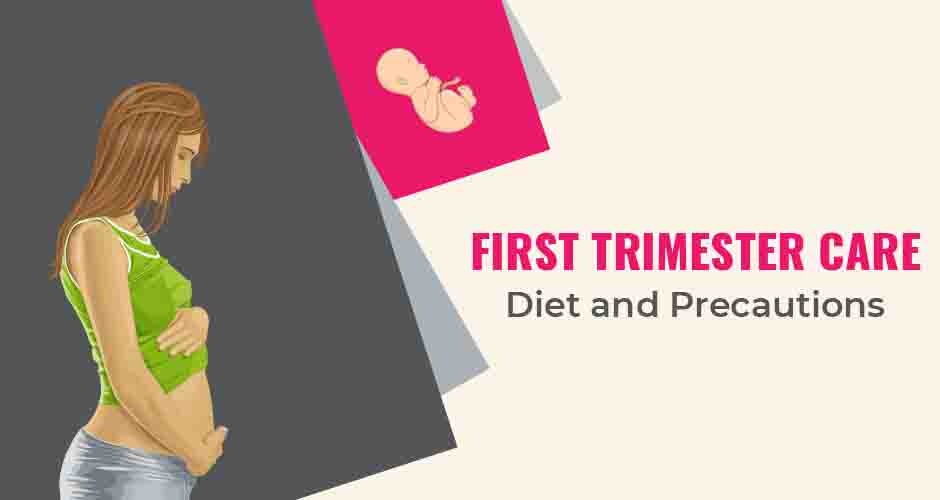
First Trimester Pregnancy Stage Care Tips: Do’s and Don’ts
The first trimester is when you have just found out that you are expecting a baby. While the physical changes are not prominent until the third month, you will experience several symptoms of pregnancy through the first trimester.
The first trimester is considered the most sensitive phase of your pregnancy with maximum chances of miscarriage. This is why you need to take utmost care in the first three months.
Here is a complete checklist of the things to do in this stage of your pregnancy and some important tips to ensure that you and your baby get exactly what you need.
First Trimester Pregnancy Symptoms and Changes
The first trimester is counted from the first day of your last period. The hormonal changes in the body are responsible for the various symptoms that you experience. Here is what you can expect in the first trimester.
- The breasts will feel swollen and tender.
- Nausea and morning sickness is quite common.
- You will feel extreme fatigue.
- You will develop aversions to certain foods.
- Constipation and heartburn are common.
- There may be cravings for certain foods.
- Frequent urination is noticed.
- Mood swings are common as a result of hormonal changes.
- Some women may lose weight due to morning sickness.
- Some may gain between 0.5kg to 2.5kg in the first trimester depending on the BMI.
Also Read: Pregnancy Care Tips – Trimester by Trimester
First Trimester Pregnancy Care Diet
The food that you eat plays an important role in helping the baby develop properly. In the first trimester, you can consume up to 1800 calories each day, which is not very different from your regular food intake.
Foods to Eat
- You should consume 3-4 servings of fruits and vegetables each day. They provide your body with the vitamins needed for the baby’s development.
- 3 servings of dairy foods like milk and curd are extremely necessary to give you the calcium needed to help support the bones as the baby grows in size.
- 2-3 servings of protein-rich foods like lentils, nuts, seeds, lean meats, poultry, and eggs are recommended.
- Get at least 3 servings of fiber-rich foods like whole grains to prevent constipation.
Food to Avoid During 1st Trimester
- Uncooked foods
- Unpasteurized milk and cheese
- Caffeine
- Alcohol
- Avoid beverages with tannin such as tea
- Spicy foods and fried foods.
Also Read: Second Month of Pregnancy
Also Read: First Month Pregnancy
First Trimester Pregnancy Care Do’s and Don’ts
- Eat small and frequent meals to prevent constipation, heartburn and morning sickness.
- Go to bed early to reduce fatigue.
- Ensure that your job does not have any work-related hazards like toxin exposure.
- If you have to travel long distances, make sure you carry something to drink.
- Stay hydrated.
- Ensure that you are physically active.
- Do not smoke, consume alcohol or any substance.
- Consult with your doctor before taking any medications or vaccinations.
- Avoid exposure to harmful chemicals in products like shampoos, soaps, hair color, etc.
- When gardening or engaging in any activity that exposes you to bacteria, wear a glove as you are extremely sensitive to infections at this stage.
- Avoid stress as much as you can.
- If you notice any signs of anxiety or extreme mood swings, try relaxation techniques such as meditation.
- Talk to your doctor about pregnancy vitamins and supplements.
First Trimester Warning Signs to Look Out For
If you notice any of the following warning signs, make sure you call your doctor immediately as the may be signals of complications in early pregnancy:
- Vaginal bleeding
- Excessive nausea and vomiting that lasts for more than 12 hours.
- High fever that is higher than 101 degrees.
- Vaginal discharge
- Pain or burning sensation when you urinate
- Leg or calf pain
- Swelling or pain in one side of the head.
- Flaring up of any condition such as asthma, high blood pressure
First Trimester Tests
The first visit will be around the fourth week and the second crucial one will be between 11 and 14 weeks. Here are the tests to expect in the first trimester:
- Blood test to determine your pregnancy
- A general health and medical history is taken
- The levels of hcG and other hormones are checked
- A urine test is done to ensure that there are no infections. In the second visit, urine is tested for sugar and protein which can help detect complications, if any.
- During the second visit, the heart beat is recorded for the first time.
- An ultrasound is done to check the development of the baby.
- You will be offered genetic tests in the second visits to check for any chromosomal abnormalities in the baby.
Also Read: Third Month Pregnancy
Want to share your experience as a mom with other moms through words or images? Become a part of the Moms United community. Click here and we will get in touch with you
null
null